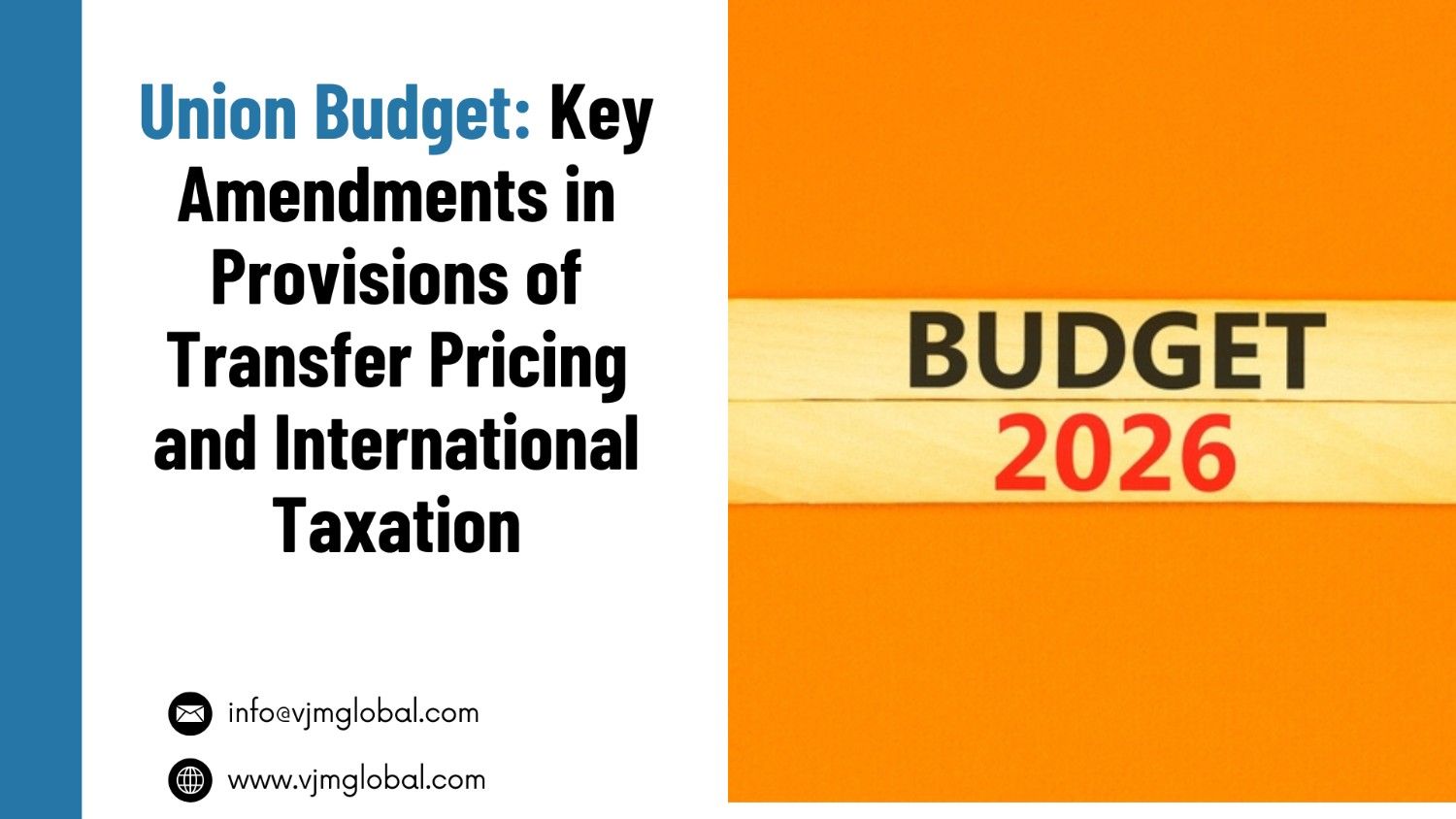DTAA Consultants In India
Every country is regulated by its own International Tax rules & Regulations. Due to globalisation, the integration and cross-border transactions with the foreign countries are increasing. DTAA has entered into the International Taxation issues to intensify the cross-border financial transactions. This issue of taxability of same income in multiple countries can be diminished in many methodical ways, one of the effective methods is a tax agreement between the countries.
We at VJM Global offer DTAA advisory and tax compliance services to both Indian & Multinational Clients. And provide tax management services to NRIs too, by following the jurisdiction of the Indian laws and regulations along with overseas countries & Double Taxation Avoidance Agreements (DTAA).

Know More about DTAA
DTAA- The Double Taxation Avoidance Agreement is certainly a Tax-Agreement directed between two nations. The objective is to ensure the taxpayer gaining income from a foreign country avoids paying taxes twice on the same income.
DTAA is beneficial to taxpayers to stimulate and promote economic proceedings amongst countries, without engaging into the jurisdiction of dual taxation.
The Double Taxation Avoidance Agreement can either be considered as a comprehensive agreement, covering every sort of income source, or target specific and limited areas. Which includes the collection of tax income from shipping, inheritance, air transport and other sections.
Some common categories falling under DTAAs are also considerable such as- services, revenue, property, capital gains, savings or fixed & deposit accounts, etc.
Presently, India has DTAA with more than 80+ countries, and there’s a prospect to sign such tax treaties with more foreign countries in future. Some of the country’s names are enrolled under the comprehensive agreements include Australia, Canada, the United Arab Emirates, Germany, Mauritius, Singapore, the United Kingdom and the United States of America.
The purpose behind a (DTAA) Double Taxation Avoidance Agreement is to represent a country appearing as an effective investment hub by providing ease on dual taxation. The Double Taxation Avoidance Agreement is a tax treaty signed between two or more countries to resolve the income taxability issues and maximize the transparency to steer clear of tax evasion. The advantages of DTAA need to be considered:
- Avoidance of Dual Taxation on the same income.
- For redemption of Income Tax in both respective countries.
- Rationalisation, equitable and reasonable taxing rights over an individual Taxpayer’s Income or gain between countries.
- Stimulate free flow of international business transactions, Trade & Investment and Technological developments.
- Increased transparency between countries.
NRIs are also benefited under the services of DTAA. If the revenue earned by the individual in India and other countries, the tax is levied on the income as per the Income Tax laws of India and the foreign country of residence. If India is sharing a DTAA with the respective country, the taxpayer can be relieved from the double taxation under the section 90 & 91 of the Income Tax Laws by the Indian government. To get the services laid under DTAA, an NRI individual needs to provide the specific documents as per the guidelines of the agreements under unavoidable circumstances:
- Self-declaration under indemnity bond
- Copy of Self-attested PAN card
- Copy of Self-attested visa and passport
- PIO proof copy (if required)
- Tax Residency Certificate (TRC)
- As per the Finance Act 2013, an individual will not be relieved of any claim benefit under the Double Taxation Avoidance Agreement unless a Tax Residency Certificate TRC is not provided to the deductor
An application needs to be made in the Form 10FA (Application for the Certificate of residence for the purposes of an agreement under the regulations of section 90 and 90A of the Income-tax Act, 1961) for the TRC to the respective income tax authorities of the country of residence.
Under the Regulations of DTAA India has fixed the specific rates at which tax will be deducted on the income of an individual residence of that respective country. This means, NRIs earn revenue in India, the TDS would be charged as per the rates categorized in the Double Taxation Avoidance Agreement with the respective country.
India has a Double Taxation Avoidance Agreement with major nations across the world. The tax rates listed here are subject to relief under the norms of the DTAA:
DTAA are mainly classified into two types- Comprehensive DTAA & Limited DTAA
Comprehensive DTAA
Almost all types of incomes are covered under the Comprehensive DTAAs. Treaty covers taxes on income, capital gains etc. The following countries are associated with the DTAA Comprehensive Agreements in respect to taxes on income
Limited DTAA
Under the limited DTAA the tax benefits are restricted to some specific areas such as income from air transport, shipping, income from estate, gift or inheritance. India has a limited DTAA treaty with the following countries:
The Indian government provides protection against double taxation on the same income under the section 90 & 91 of Income Tax Act. This relief mechanism is classified into three distinct methods:
Deduction Method
The taxpayer of the country of residence can claim a deduction for income taxes, paid to the foreign government concerning the income from the foreign sources.
Exemption Method
This method assures full avoidance of taxes, that means the taxpayer is exempted from the foreign source of income.
Credit Method
The credit method is subdivided into two categories:
- Ordinary Credit: As per the norms of the ordinary credit, the taxpayers of the respective country pays either full or partial credit taxes for the income. The taxes will be determined on the same source of income but charges a lower amount with the extent of the credit facility.
- Underlying Credit: Credit available for corporate tax when a dividend is paid by an individual or resident of one state to another area. This is mainly an additional tax paid on dividend.
- The objective is to upgrade the possibilities of trade flow & investment by prohibiting differentiation between taxpayers. Addition of fiscal certainties to the cross-border functionings.
- Prevention from the threats of international evasions & taxation avoidance.
- Provide facilitates to collect international taxation. Procurement of finances for International development & steer clear of double taxation by applying the rights of taxation between the revenue source and the country of residence.
- Promote harmony amongst the nations to operate the proper functioning of international taxation & to reduce the burden of taxation.
- Tax treaties assist the taxpayers in standing against the double taxations issues and providing a transparent and free flow of foreign exchange affairs, thus boost up the scope of foreign investments in the country.
- Additionally, these treaties have provisions to accommodate a mutual exchange of information and alleviate litigation by supplying mutual assistance policy.
- The agreements offer a legal bonding, jurisdiction amongst the source & residence country. This agreement has a considerable value under the international taxation law.
- These treaties provide the taxation right considering the income in lieu of interest, royalty, dividends and fees for providing technical services to the residence country. However, for the source country, the taxation has been regulated to the specific rates mentioned in the treaty.
- The authority to tax Directors fees, the salary of individuals in the Government service, income of entertainers, payments gained by students and apprentices, & athletes, payments of social security, pensions and several incomes comes under this agreement.
We VJM Global provide effective solutions and International Tax advisory services to protect the Indian taxpayers and NRI from unethical practices of taxation. DTAA ensures that Indian trade and services are not affected & offers harmony with countries under the jurisdiction of Indian Law & Authority. Our DTAA Consultants offer effectual data management, corporate taxations and Income tax consultancy services to the clients to cut-down the liabilities of dual taxation.
Testimonials
What our clients say about us
FAQ on DTAA
Double taxation avoidance agreement is the bilateral agreement between two nations or more, jurisdiction on the same income, assets, and other financial transactions. To avoid the contradiction in double taxation the tax treaty has been introduced under the jurisdiction of the Indian income tax regulations.
A tax agreement between two or more countries to assist taxpayers from the double taxation on the same income. An individual or a company is gaining profit or earning income in a foreign country and resides in one country is accountable under the jurisdiction of DTAA, if the countries are agreed with the tax treaty.
Following are the benefits we can consider through DTAA:
DTAA encourage cross-border transfer of technology
Helps tax authorities to prevent tax avoidance, avoid discrimination between taxpayers, grant relief
Improves the co-operation between multiple taxing authorities
Promotes exchange of goods and services, allows movement of capital and person
(DTAA) Double Taxation Avoidance Agreement is a tax treaty signed between India and other countries in order to expand the business activities and provide harmony with the states. India has comprehensive DTAAs with more than 80+ countries across the globe that means any resident of a foreign country is liable to pay taxes on certain nature of incomes under the jurisdiction and regulations of the Indian government.
Why Choose Us

Client Centric Approach
Client is the key driver of our service offerings. Our approach to service offerings is based on a client centric and customized approach. Our specialized teams are a mix of technical and industry experience in order to serve clientele for their specific needs.

Quick Turnaround
We always endeavour for a quick turnaround time to serve our clientele. We are supported by an experienced and client focussed support teams to offer timely services to our clientele. In case of any business exigencies and time sensitive service requirements, you can always count on us.

Team Work
We have built high performing teams supported by strong work ethic. Our team is a mix of experts, professionals and support staff from technical and varied academic, cultural, social and ethnic backgrounds. We believe that this diversification plays a vital role in motivating the team into High Performing Teams.

Open Communications
We believe that open communication is the core principle in order to demonstrate trust, build long lasting and valuable relationships with clientele. We are committed to ensuring transparency in communication, service offerings and delivery.

Driving quality in delivery
Our service offerings are driven by quality and reviews at every level. We strive to provide a qualitative and value-added delivery to our clientele. At all times, we endeavour to provide exceptional client service by meeting client expectations and driving client satisfaction.


.jpg)

.webp)
.webp)
.webp)



